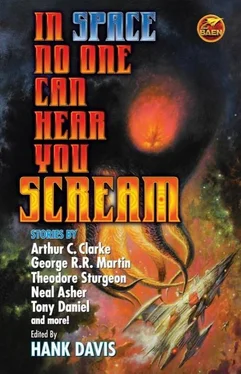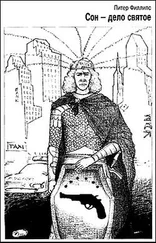Питер Филлипс - In Space No One Can Hear You Scream
Здесь есть возможность читать онлайн «Питер Филлипс - In Space No One Can Hear You Scream» весь текст электронной книги совершенно бесплатно (целиком полную версию без сокращений). В некоторых случаях можно слушать аудио, скачать через торрент в формате fb2 и присутствует краткое содержание. Город: Riverdale, NY, Год выпуска: 2013, ISBN: 2013, Издательство: Baen Books, Жанр: Фантастика и фэнтези, на английском языке. Описание произведения, (предисловие) а так же отзывы посетителей доступны на портале библиотеки ЛибКат.
- Название:In Space No One Can Hear You Scream
- Автор:
- Издательство:Baen Books
- Жанр:
- Год:2013
- Город:Riverdale, NY
- ISBN:978-1-4516-3941-4
- Рейтинг книги:4 / 5. Голосов: 1
-
Избранное:Добавить в избранное
- Отзывы:
-
Ваша оценка:
- 80
- 1
- 2
- 3
- 4
- 5
In Space No One Can Hear You Scream: краткое содержание, описание и аннотация
Предлагаем к чтению аннотацию, описание, краткое содержание или предисловие (зависит от того, что написал сам автор книги «In Space No One Can Hear You Scream»). Если вы не нашли необходимую информацию о книге — напишите в комментариях, мы постараемся отыскать её.
In Space No One Can Hear You Scream — читать онлайн бесплатно полную книгу (весь текст) целиком
Ниже представлен текст книги, разбитый по страницам. Система сохранения места последней прочитанной страницы, позволяет с удобством читать онлайн бесплатно книгу «In Space No One Can Hear You Scream», без необходимости каждый раз заново искать на чём Вы остановились. Поставьте закладку, и сможете в любой момент перейти на страницу, на которой закончили чтение.
Интервал:
Закладка:
But Rakkis only stared at him, and would not move. “Why, what’s wrong, Simon? I don’t understand. What about your party?’
And then it was too late, because the loose sand all around them was stirring, and the red eyes were staring at them, and the mandibles were clacking. Rakkis made a choking sound, and moved to get back in his skimmer, but a pair of mandibles snapped shut about his ankle, and suddenly he was on his knees. The sand seemed to boil with subterranean activity. Jad thrashed and cried terribly as they tore him apart. Kress could hardly bear to watch.
After that, he did not try to escape again. When it was all over, he cleaned out what remained in his liquor cabinet, and got extremely drunk. It would be the last time he would enjoy that luxury, he knew. The only alcohol remaining in the house was stored down in the wine cellar.
Kress did not touch a bite of food the entire day, but he fell asleep feeling bloated, sated at last, the awful hunger vanquished. His last thoughts before the nightmares took him were of whom he could ask out tomorrow.
Morning was hot and dry. Kress opened his eyes to see the white sandking on his dresser again. He shut them again quickly, hoping the dream would leave him. It did not, and he could not go back to sleep. Soon he found himself staring at the thing.
He stared for almost five minutes before the strangeness of it dawned on him; the sandking was not moving.
The mobiles could be preternaturally still, to be sure. He had seen them wait and watch a thousand times. But always there was some motion about them—the mandibles clacked, the legs twitched, the long fine antennae stirred and swayed.
But the sandking on his dresser was completely still.
Kress rose, holding his breath, not daring to hope. Could it be dead? Could something have killed it? He walked across the room.
The eyes were glassy and black. The creature seemed swollen, somehow, as if it were soft and rotting inside, filling up with gas that pushed outward at the plates of white armor.
Kress reached out a trembling hand and touched it.
It was warm—hot even—and growing hotter. But it did not move.
He pulled his hand back, and as he did, a segment of the sandking’s white exoskeleton fell away from it. The flesh beneath was the same color, but softer-looking, swollen and feverish. And it almost seemed to throb.
Kress backed away, and ran to the door.
Three more white mobiles lay in his hall. They were all like the one in his bedroom.
He ran down the stairs, jumping over sandkings. None of them moved. The house was full of them, all dead, dying, comatose, whatever. Kress did not care what was wrong with them. Just so they could not move.
He found four of them inside his skimmer. He picked them up one by one, and threw them as far as he could. Damned monsters. He slid back in, on the ruined half-eaten seats, and thumbed the startplate.
Nothing happened.
Kress tried again, and again. Nothing. It wasn’t fair. This was his skimmer, it ought to start, why wouldn’t it lift, he didn’t understand.
Finally he got out and checked, expecting the worst. He found it. The sandkings had torn apart his gravity grid. He was trapped. He was still trapped.
Grimly, Kress marched back into the house. He went to his gallery and found the antique axe that had hung next to the throwing-sword he had used on Cath m’Lane. He set to work. The sandkings did not stir even as he chopped them to pieces. But they splattered when he made the first cut, the bodies almost bursting. Inside was awful; strange half-formed organs, a viscous reddish ooze that looked almost like human blood, and the yellow ichor.
Kress destroyed twenty of them before he realized the futility of what he was doing. The mobiles were nothing, really. Besides, there were so many of them. He could work for a day and night and still not kill them all.
He had to go down into the wine cellar and use the axe on the maw.
Resolute, he started down. He got within sight of the door, and stopped.
It was not a door any more. The walls had been eaten away, so that the hole was twice the size it had been, and round. A pit, that was all. There was no sign that there had ever been a door nailed shut over that black abyss.
A ghastly, choking, fetid odor seemed to come from below.
And the walls were wet and bloody and covered with patches of white fungus.
And worst, it was breathing.
Kress stood across the room and felt the warm wind wash over him as it exhaled, and he tried not to choke, and when the wind reversed direction, he fled.
Back in the living room, he destroyed three more mobiles, and collapsed. What was happening? He didn’t understand.
Then he remembered the only person who might understand. Kress went to his communicator again, stepping on a sandking in his haste, and prayed fervently that the device still worked.
When Jala Wo answered, he broke down and told her everything.
She let him talk without interruption, no expression save for a slight frown on her gaunt, pale face. When Kress had finished, she said only, “I ought to leave you there.”
Kress began to blubber. “You can’t. Help me. I’ll pay . . .”
“I ought to,” Wo repeated, “but I won’t.”
“Thank you,” Kress said. “Oh, thank—”
“Quiet,” said Wo. “Listen to me. This is your own doing. Keep your sandkings well, and they are courtly ritual warriors. You turned yours into something else, with starvation and torture. You were their god. You made them what they are. That maw in your cellar is sick, still suffering from the wound you gave it. It is probably insane. Its behavior is . . . unusual.
“You have to get out of there quickly. The mobiles are not dead, Kress. They are dormant. I told you the exoskeleton falls off when they grow larger. Normally, in fact, it falls off much earlier. I have never heard of sandkings growing as large as yours while still in the insectoid stage. It is another result of crippling the white maw, I would say. That does not matter.
“What matters is the metamorphosis your sandkings are now undergoing. As the maw grows, you see, it gets progressively more intelligent. Its psionic powers strengthen, and its mind becomes more sophisticated, more ambitious. The armored mobiles are useful enough when the maw is tiny and only semi-sentient, but now it needs better servants, bodies with more capabilities. Do you understand? The mobiles are all going to give birth to a new breed of sandking. I can’t say exactly what it will look like. Each maw designs its own, to fit its perceived needs and desires. But it will be bi-ped, with four arms, and opposable thumbs. It will be able to construct and operate advanced machinery. The individual sandkings will not be sentient. But the maw will be very sentient indeed.”
Simon Kress was gaping at Wo’s image on the viewscreen. “Your workers,” he said, with an effort. “The ones who came out here . . . who installed the tank . . .”
Jala Wo managed a faint smile. “Shade,” she said.
“Shade is a sandking,” Kress repeated numbly. “And you sold me a tank of . . . of . . . infants, ah . . .”
“Do not be absurd,” Wo said. “A first-stage sandking is more like a sperm than an infant. The wars temper and control them in nature. Only one in a hundred reaches second stage. Only one in a thousand achieves the third and final plateau, and becomes like Shade. Adult sandkings are not sentimental about the small maws. There are too many of them, and their mobiles are pests.” She sighed. “And all this talk wastes time. That white sandking is going to waken to full sentience soon. It is not going to need you any longer, and it hates you, and it will be very hungry. The transformation is taxing. The maw must eat enormous amounts both before and after. So you have to get out of there. Do you understand?”
Читать дальшеИнтервал:
Закладка:
Похожие книги на «In Space No One Can Hear You Scream»
Представляем Вашему вниманию похожие книги на «In Space No One Can Hear You Scream» списком для выбора. Мы отобрали схожую по названию и смыслу литературу в надежде предоставить читателям больше вариантов отыскать новые, интересные, ещё непрочитанные произведения.
Обсуждение, отзывы о книге «In Space No One Can Hear You Scream» и просто собственные мнения читателей. Оставьте ваши комментарии, напишите, что Вы думаете о произведении, его смысле или главных героях. Укажите что конкретно понравилось, а что нет, и почему Вы так считаете.









